by Mayumi-H | May 22, 2013 | Persona 4 Fan Fiction, Process, Short Stories
A few weeks ago, I wrote about a particular Free Write Friday picture prompt (Free Write Fridays from Kellie Elmore). What came from that free write session was about 1600 words of a relationship story, one that flowed so naturally from my fingers, I just couldn’t stop writing it. As I mentioned in that earlier post, what struck me as I wrote those characters was how much of a role their religion played in their dialogue. Their sexuality also featured prominently, which is one of the main reasons why I didn’t post the piece at the time. Because you never know who you might offend.
Generally speaking, offending potential readers is not something I care very much about. It’s my belief an artist should create Art that speaks from the soul, no matter how dark, bright, raunchy, or chaste. Whether the artist can then sell that creation if they so choose is an entirely different debate. But, the Art at its core should be honest. Otherwise, it’s not so much art or even craft, but simply a consumable.
Side note: I’m not saying there’s anything inherently wrong with producing for consumption. Nor am I saying consumables necessarily exclude artistry, or vice versa. I think A Song of Ice and Fire has proven that pretty well. Besides, every one needs to eat, no matter how high-falutin’ their principles.
That said, I recently revisited that piece of free writing because I was curious to look at it with fresh eyes. I wanted to see if it really was as bad as I’d originally thought. Holding a marker, I went over and redacted everything I thought anyone could possibly find offensive in any way. This is what came of that exercise:
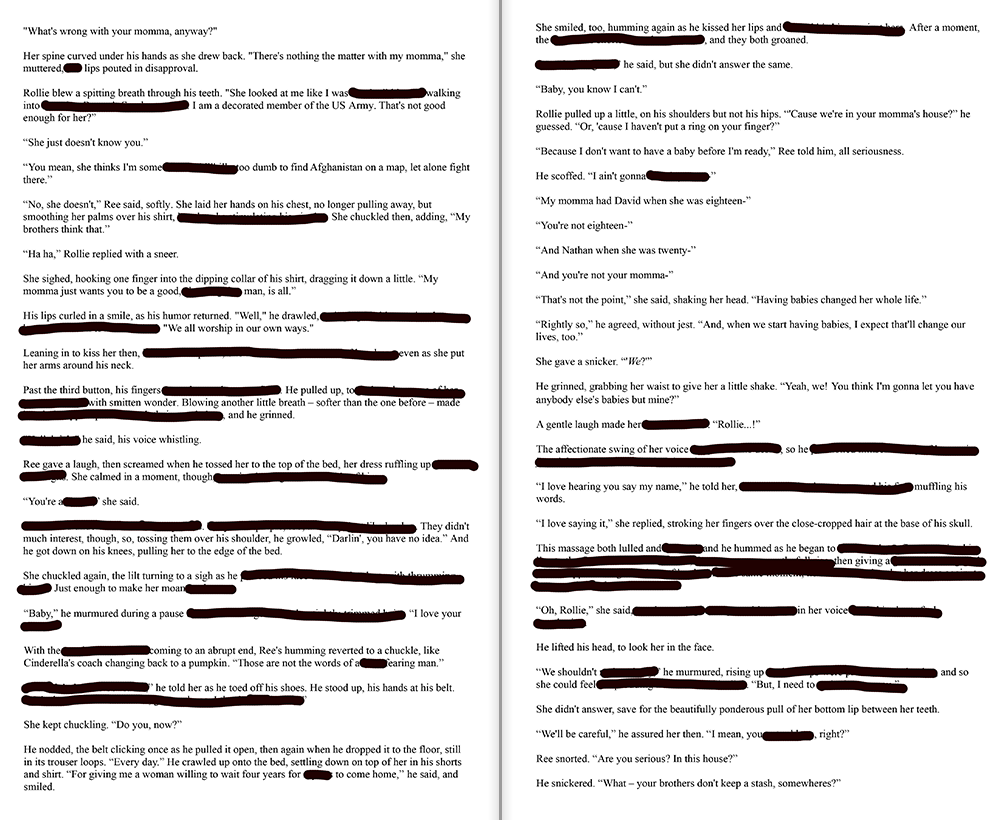
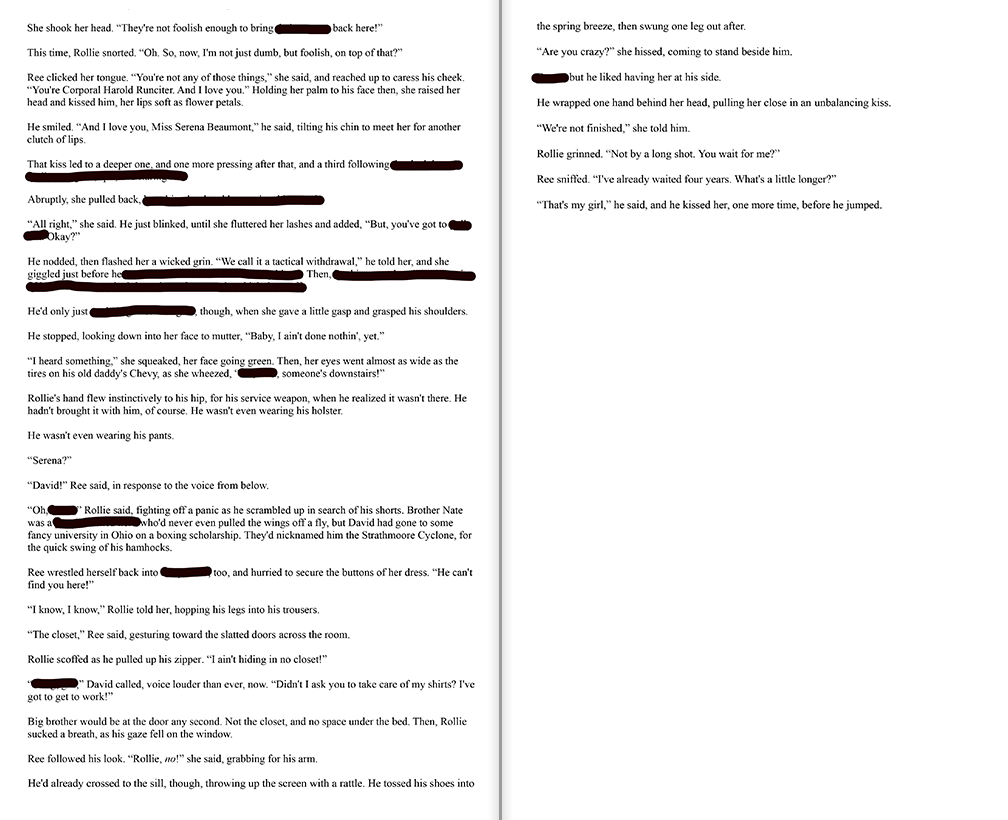
If, for some reason, you’re interested in the actual words, click the images for a more legible experience (they’ll open in a new window or tab). The scene itself isn’t important, though. The reason for this exercise – aside from fueling my own personal amusement – was for me to see just how much black there’d be on those pages.
I’m not particularly smart, so I can’t write good mysteries or thrillers. I’ve only ever held a gun once, and never in a conflict, so I’m not qualified to write a big war epic. But, I understand people, and the everyday conflicts that can arise from personality and heritage clashes. I know love, too, because I experience it in my life every day. And I like sex, because…well, who doesn’t?
I don’t pull many punches when it comes to my stories. I try my best to warn folks ahead of time if a story contains questionable or mature material, but I also believe any individual should be able to decide for themselves if they want to continue or not. But, I’m writing these for me, first, and those topics are the ones I personally enjoy exploring. If they need to be redacted later, to fit someone else’s idea of what’s appropriate or salable, well, that’s life.
Have you ever redacted or edited something you’d written to fit someone else’s sensitivities? Why did you do it? Or, if you didn’t do it, why not?
by Mayumi-H | Apr 27, 2013 | Short Stories
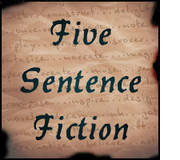 I want to get back into free writing and challenges, and Lillie McFerrin’s Five Sentence Fiction this week seemed to be a good way to do it. Lillie’s prompt this time was “SHADOWS” – you can follow the link to read some of the other takes on this inspiring word.
I want to get back into free writing and challenges, and Lillie McFerrin’s Five Sentence Fiction this week seemed to be a good way to do it. Lillie’s prompt this time was “SHADOWS” – you can follow the link to read some of the other takes on this inspiring word.
While walking home from work, the following scene just sort of popped into my head. Some of the characters and details come from an earlier idea I had a long time ago, so they may seem a bit familiar to some of my older readers. Still, it’s always nice when these prompts cause me to revisit a thought-to-be-discarded plot line.
“Even in the Dark”
He hadn’t come to be known as Sirrus the Grim for nothing: red-bearded mountain clans, dark-skinned islanders, blue-eyed snow walkers – all of them had felt his wrath for their disrespect, howling in the night over their precious poisoned firstborns.
By now, the princess’s royal guard would have found her, still and pale in her bed, for there could be no marriage between sea and cloud, not when his brothers in The Shroud were so close to keeping the king’s blood pure forever.
Prince Alraune might mourn, but he would come to understand: the sea princess was no better than a whore, a troublesome upstart who knew nothing of nobility, who’d already let her guard – her dull, plebeian guard! – take her maidenhead.
Sweeping around a corner, his cloak caught on a jagged edge of stone, and Sirrus tore it loose with a curse beneath his breath; these hidden corridors were unknown to all but Shroud, but he couldn’t waste a moment to return to the prince’s side, to keep his secrets intact-
A hand shot out from the umbra, grasping his neck, and the face of the wave rider princess’s guard filled his vision, snarling, “Even in the dark, Lord Sirrus, you cast a long shadow.”
There’s a lot of telling in this attempt, I know. Nonetheless, I rather enjoyed digging into Sirrus’s head, here.
I don’t know if I write villains well; my conflicts tend to be ones out of the characters’ control. I certainly don’t tend to look at stories from the villain’s perspective, though perhaps I should reconsider that, since his voice spoke to me with this one.
Did you poke your head into any SHADOWS, this week? Do you write villains? Have you ever written from the villain’s perspective? Why, or why not?
by Mayumi-H | Apr 24, 2013 | Uncategorized
Before I get into this post, I need to take a second to apologize to those bloggers whom I follow. I’ve got a backlog of your updates sitting in my inbox, pestering for my attention, but I want to be able to approach your shared words with a clear headspace, and I haven’t had that, in recent days. I promise, I’m getting there, but it may take me a few extra days, yet.
Anyway….
I try to keep this blog to talking about my writing, as that’s been its purpose since its inception. But, sometimes, life intrudes into my work in confounding ways.
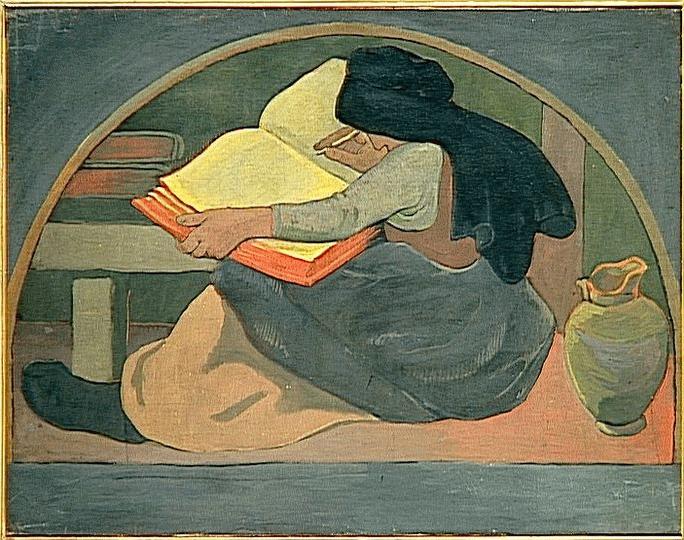
“La Grammaire” (1892) Paul Sérusier [Public domain], via Wikimedia Commons
I don’t hold many feelings of nostalgia for the place itself, perhaps because I haven’t lived “at home” since I went away to university. But, the people still hold significance to me. Understandably so, as they’re my closest relatives. I visit perhaps once or twice a year, and that’s been enough for me, in the past. But, lately, I’ve really come to notice and realize how…well…old my parents are getting.
My mother and father were not typically young parents. My husband’s parents, for example, were married at not much past twenty, and had him when they were still in college. My parents were in their thirties when they had my sister and me. In the pre-Millennial generations, that was old.
Deep down, I’ve always had a concept of mortality. But, faced specifically with my parents‘ mortality has been scary. Especially when discussing wills, deeds, insurance financials, and what happens if one of them “goes” before the other.
Over this last visit, both my mother and father approached the subject rationally with me, and I tried to do the same. Maybe it’s a kind of emotional denial on my part, but I kept thinking, “How would [character X] deal with this situation?” It’s timely and fitting, right now, as I do have a story where this subject – that of a parent’s death – is an integral plot point. It doesn’t really make the issue any easier, though. It just gives me a safe sense of distance.

“Death of Barbara Radziwiłł (detail)” by Józef Simmler [Public domain], via Wikimedia Commons
I’ve written about death in my stories before. I don’t like treating it lightly, because even the most insignificant of deaths – relatively speaking, that is – has an impact on somebody, in fiction just as in real life.
Hmm. Reading over that last sentence just now, I can’t help but think I’m still a bit in denial about the whole process.
Part of the scariness of the prospect is that I’ve always been close to my parents, even though I’ve lived far away. I may not speak to them every week, but I certainly think of them that often, or more. To consider life without them is unsettling. Realistic, and likely unavoidable, but discomfiting nonetheless. Without them, I’d be an orphan.
That sounds silly for an adult woman. The word “orphan” has a connotation of a sooty-faced, Victorian-era street urchin, or a child sitting alone by a window, waiting for a nice couple to come along to adopt them. But, it’s true. Not that I’d be alone if my parents passed away. I have a family of my own, and a sister, cousins, aunts and uncles…. They’re not the same, though.
I’ve always known one of the principle building blocks of good fiction is conflict. It creates tension, builds character. I strive for realistic conflict in my stories. In my life, though? I could do with a little bit less of the stuff.
I’ll try to return this blog to its regularly scheduled programming by next update. Til then, bear with me, okay?
by Mayumi-H | Apr 17, 2013 | Persona 4 Fan Fiction, Process
Last Friday’s Free Write Friday prompt from Kellie Elmore was the below photo:
What struck me about the photo was not so much the twister itself or the girl in the foreground, but the way people’s lives can often feel like they’re caught in a storm. And, how lonely that girl’s silhouette is. From nowhere – truly, nowhere, as I am, at the moment, working on three very different stories with nothing to do with the prompt – a scene popped into my head, bright as a bolt of lightning: a young man and young woman hiding together, to be together. It was very conversational but still mostly descriptive of their clandestine affair, which is why I chose not to submit it to the prompt.
The odd part about this story snippet was not the flash of inspiring imagery, or the way these characters felt like familiar ones to me, or even the main conflict fashioned by my brain for why the two of them should meet in secret. Rather, it was the smaller conflict of their histories. Specifically, how religion related to their interaction.
If you think violence or sex are hot-button issues, they’re nothing compared to religion. I don’t even feel very comfortable talking about it, here, because… I don’t know. Because I’m scared, I guess.
Not many readers take issue with crime or violence in stories. It’s part of real life, after all. Sex is a slightly touchier subject, probably because it’s associated with prurience or deviance (which is not always the case, but I think I’ve belabored that point already). Faith, though, is unique to each individual person. Nonetheless, it often feels like we’re treated only to religious extremes, in fiction: fanatics like Margaret White (the mom in Stephen King’s Carrie) or the Republic of Gilead in Margaret Atwood’s The Handmaid’s Tale. Given such examples, it’s hardly a wonder that religion often does not play a role in many stories, at least, not a prominent one.
So, why did I take a religious angle for that scene? Mostly, it came from the dialogue. Evidence of their faith sprang, fully formed, from these characters’ mouths. They didn’t preach to me or to each other. They simply were who they were: a mid-western society girl and her working-class, ex-Army boyfriend. Not even their different racial backgrounds featured so prominently in their characterizations as their religious upbringing.
It was weird. Because my own faith is very personal, and I’d never inject those feelings into a story. Not consciously, any way. Sure, religion has had its part. I’ve examined Shinto, but only for the burial rituals and a wedding ceremony; two of my earlier protagonists were Catholic versus Protestant just for a few low-level jabs; I’ve looked at Anglicanism in a broader sense from a social perspective, mostly to counterbalance the dourness of one of my scientific empiricists. But having characters mouth off to each other about church and faith? That was new.

Shrine to World Religions, by Helen (Flickr: Shrine To World Religions) [CC-BY-2.0], via Wikimedia Commons
Have you ever had your characters take you by surprise, about their personal agendas or perspectives?
by Mayumi-H | Apr 10, 2013 | Process
Knowing how to write dialogue is an important tool for a writer. Even more important, though, I’d wager, is being able to write believable dialogue. Countless articles and books have been written on the subject, but the same advice always crops up: Pay attention and listen.

By David Benbennick [GFDL (http://www.gnu.org/copyleft/fdl.html), CC-BY-SA-3.0 or CC-BY-SA-2.0], via Wikimedia Commons
What we hear in daily conversation doesn’t always work for the written word, of course. Slang, for example, can be problematic to explain to someone unfamiliar with its roots, just as dialect speech can be nightmarish for a reader to slog through. (Joseph, I’m looking at you.) Generally speaking, though, even these examples don’t have to be make-or-break issues with dialogue. If your characters are strong enough in their own voices, the little tweaks and twinges shouldn’t matter so much. Quirky speech patterns can even help identify characters to the audience, often a good thing.
But, those are generalities. I’m talking about specifics, here.
The other day, while sitting with some friends, we were talking about the transience and flow of language across generations. The discussion went pretty deep as we argued our opinions and went back and forth with pros and cons to each perspective. Then, from nowhere, one friend piped up, “I’m gonna bring back ‘rad’ to the common lexicon.”
I burst out laughing…and I knew I’d have to use it in a story.
My friends learned a long time ago that almost nothing said in my presence is sacred. Not to say I can’t keep a secret, because I can do that. But, the words themselves become free to my pen, the second they’ve left anyone’s mouth. I don’t make any excuses for myself in this regard. If I hear it with my ears, it instantly becomes reality – and believable – to me. And, that makes for great dialogue.
Some of my favorite conversations in real life I’ve decided to preserve in my stories. Many of them were simply jotted down in 100-word shorts or random snippets tucked into the pages of a notebook, for use – or not – at some later date. But, others have found their way actively woven into the larger tales, adding a sense of deeper realism and stronger truth to the story that may not have been so deep or so strong without them.
Other writers (ones better than me) say to listen to the world and words around you. Pay attention to the details. Keep your eyes and ears open. And, that inspiration can be sitting right in front of you. Or just to the left, spouting pearls of beautiful dialogue between peanuts and sips of beer.
Some among you may consider my technique of stealing borrowing words from such conversations cheating at my art. As for me, I prefer to consider it art imitating life. For real.
How do you create believable dialogue? Have you ever used real conversations in your stories? Were you able to read Joseph’s dialogue from Wuthering Heights without looking at a translation sheet?







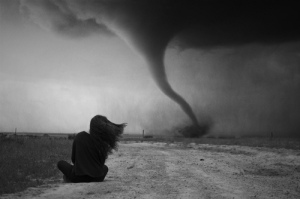


Recent Comments